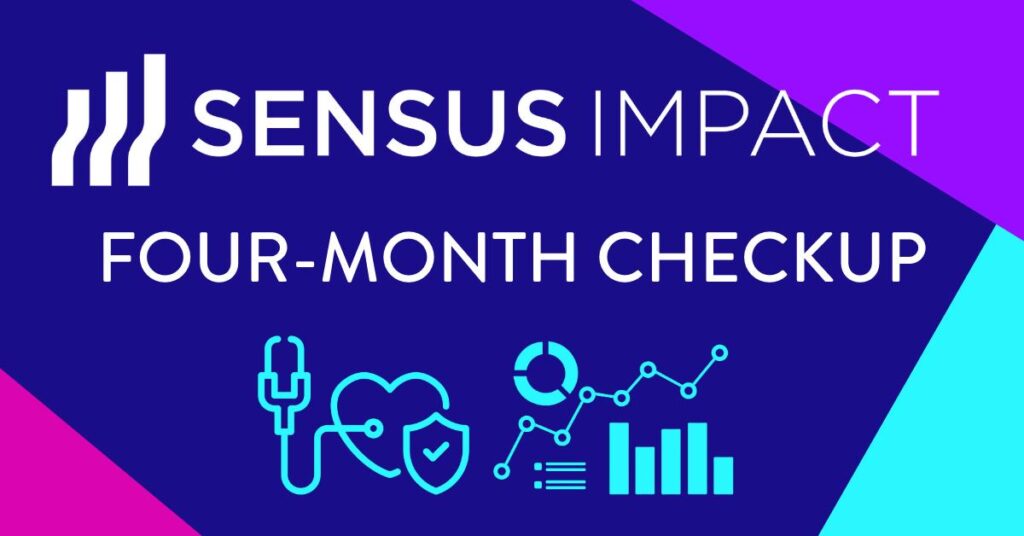So, I thought it would be a good time for a checkup. Are we hitting our growth milestones? Are we nurturing a tool that will become a valued member of our scholarly publishing ecosystem? To avoid allusions to potty training, I’ll leave this metaphor here and simply talk about Sensus Impact. Let’s take a look at what we have learned, and where we are going.

Milestones since February 14th:
We launched Sensus Impact on Valentines Day, and have hit the ground running to make sure everyone in this community understands the role of this tool. That includes:- Two conference presentations on Sensus Impact (NISO Plus and SSP Annual Meeting)
- 20+ conversations about the product with influential publishers and funders
- 2+ feature additions to the Funder Dashboards, including the launch of policy citation counts alongside other attention data, powered by Altmetric
- 62 Sensus newsletter sign-ups
- 63 Community of Practice members
- Over 2,800 visitors to the site
At their core, scholarly publishers and funders want the same thing: to disseminate high quality research as widely and effectively as possible. Scholarly publishers have long been the curators of this intellectual ecosystem, providing a suite of critical services (including editorial oversight, peer review facilitation, metadata management, and the promotion of research integrity). Their role extends beyond distribution; modern publishing platforms are vital connectors of research to an audience that spans students, academics, policymakers, and the public.
Accountability in an age of scrutiny
Today’s ecosystem is competitive and complex, and it is increasingly important to showcase the impact of publishers’ work in clear, tangible terms. Funders have a mix of data at their fingertips, but it often lacks a cohesive story: How has our funding catalyzed research? What projects have sprung from this investment? How does this tie into our organizational mission? And, perhaps most significantly, how is our funding translating into real-world benefits? The answers to these questions are fragmented across various data systems, with metadata management falling short of ideal and organizational siloes complicating the flow of information.Sensus Impact seeks to provide funders with a clear visualization of their investment's footprint—right now encompassing page views, citations, downloads, and alternative metrics—crafting that narrative around funding dollars and hopefully saving on redundant activities to knit everything together and analyze data on the funder side.
Where trust and impact collide
Today’s research ecosystem is also not long on trust. Research integrity challenges seem to multiply, and the industry is abuzz with the closures of journals and the emergence of technologies to detect unethical practices.While the industry writ large is far from where it would like to be, it's crucial not to lose sight of the strides made by publishers to promote transparency and interoperability in scholarly research. Sensus Impact not only leverages these efforts (publishers must have metadata facets that identify funding in order to effectively transfer articles to Sensus) but brings them to the forefront, highlighting the often-invisible yet labor-intensive work of publishers.
Sensus effectively curates content with precise funder and grant information, showcases data availability statements, ORCIDs, and detailed licensing information, with plans to integrate open science indicators, links to external datasets, and tools for tracking the prevalence of research summaries and infographics aimed at enhancing public access to research.
Synthesizing metrics requires metadata
What sets Sensus Impact apart is its unique ability to synthesize different metrics that together paint a holistic picture of the impact of funded research. It measures scientific community reach and impact through reads and downloads; social and public reach and impact via alternative metrics; and the influence on the future direction of science and discovery through citations.As a community-driven yet commercially supported entity, Sensus Impact ensures long-term sustainability, scalability, and responsiveness to market shifts. We have big plans for growth, all shaped by community input, but one of the most striking truths that continues to be reinforced through my conversations with publishers and other industry stakeholders is just how big of a range in metadata quality we have.
In many ways, I think Sensus Impact shines a light on the importance of metadata management. Publishers play a huge role in extending the reach of published research, but funders will never be able to measure this reach and impact without the right metadata in place.
Where are we going with Sensus Impact
I like to dream big and think strategically when it comes to Sensus Impact. Looking ahead, the vision for Sensus Impact is ambitious and multi-faceted. It involves:- Partnering with additional publishers: By extending our network, we increase the value Sensus has for funders and can amplify the need to measure impact more broadly.
- Launching new funder microsites: Our goal is to demonstrate impact outside of large US agencies, which was the focus of our launch. We’re adding 5-10 new agencies, with a list informed by our Community of Practice.
- Considering per-publisher reporting: Sensus Impact is all relationships between funders and publishers. Per-publisher reporting adds value for publishers to evaluate their impact.
- Expanding to include more data streams: To demonstrate publisher dedication to Open Science, we’re adding more metrics to compare and evaluate. First up will be patent citation information, courtesy of Altmetric.
- Foster a collaborative industry platform steered by community feedback.
- Boost product awareness and demonstrate the impact of publishers within the funding community.
- Nurture a symbiotic relationship between funders and publishers, all in service of the research community and the public good.